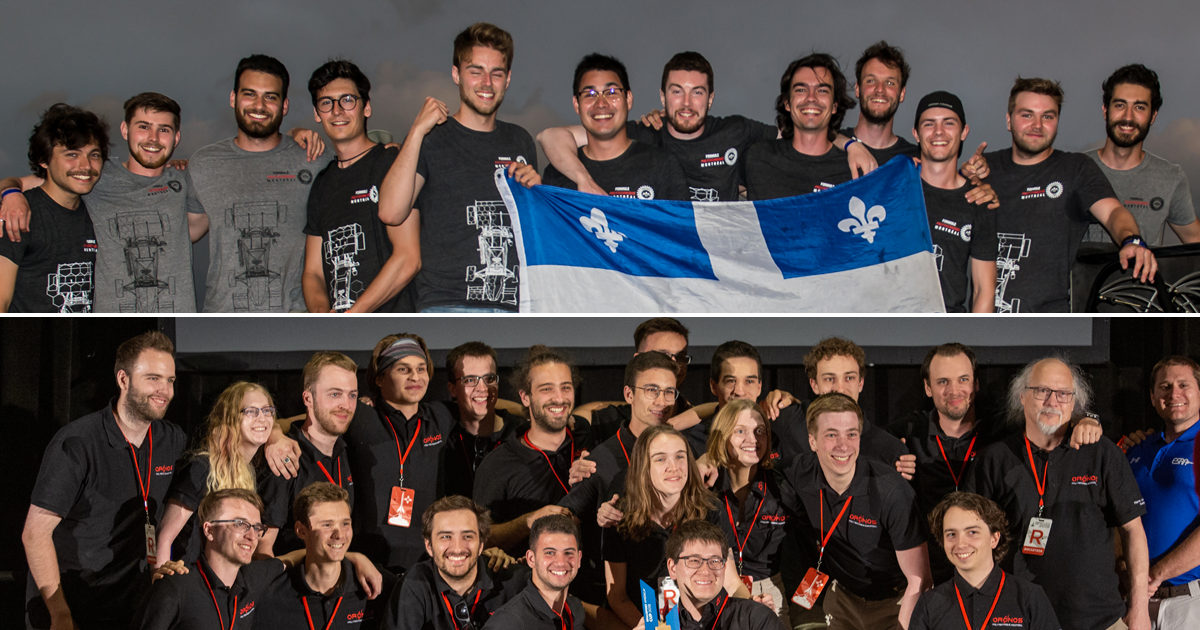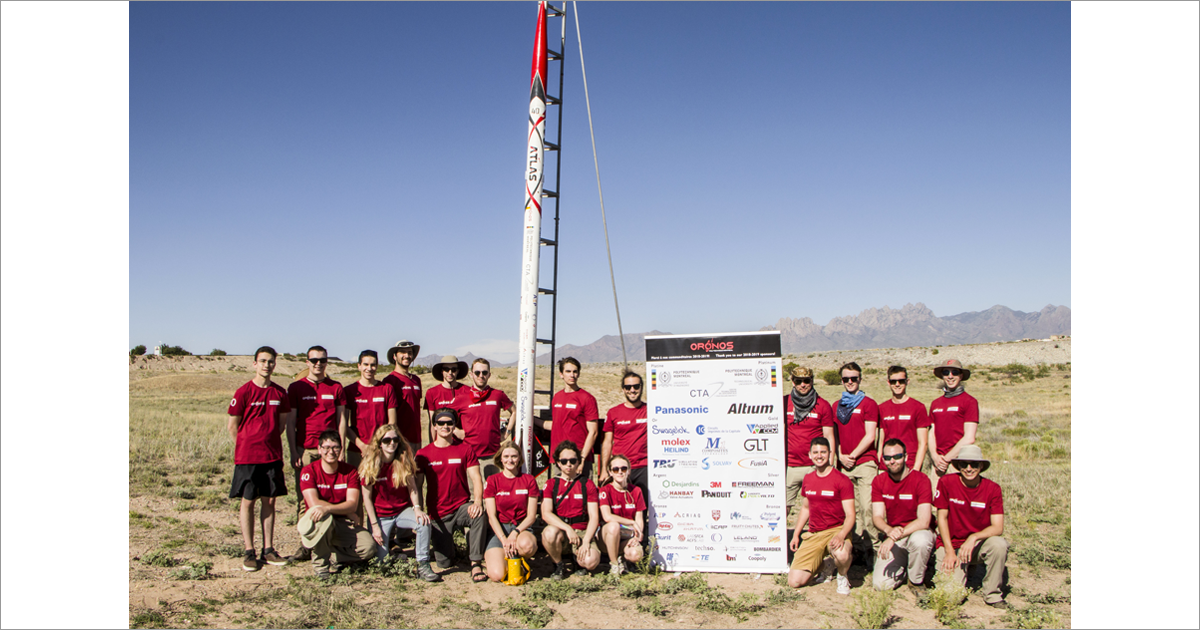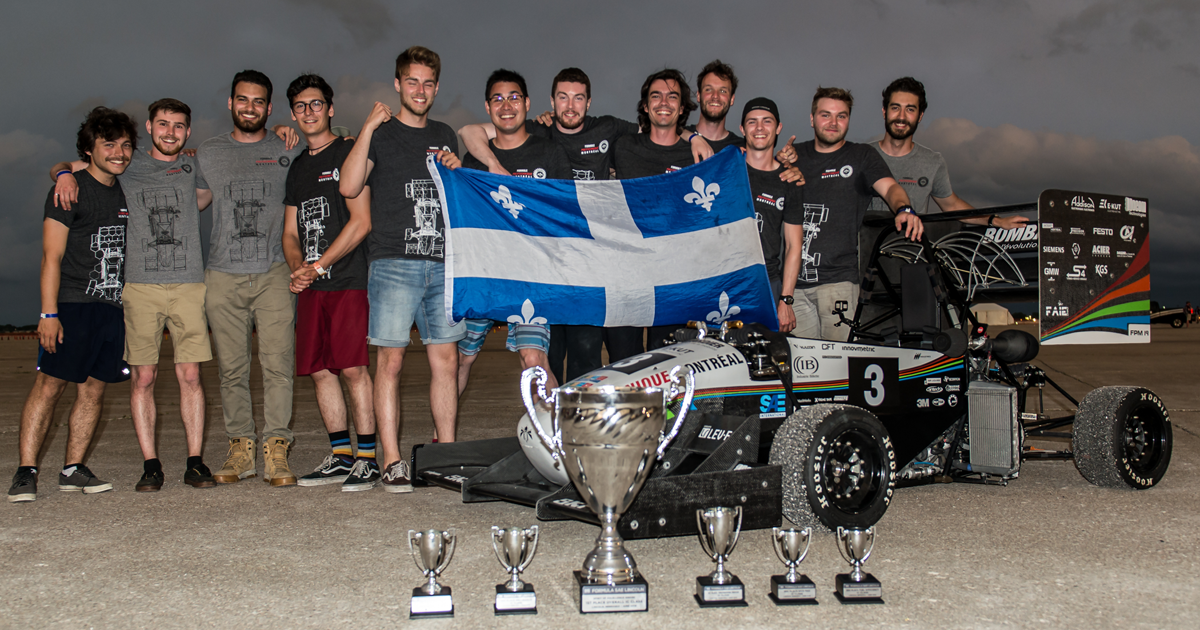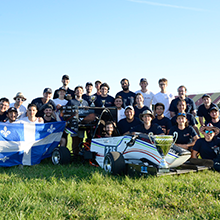Nouvelles
Oronos Polytechnique and Formule Polytechnique Montréal earn first place in two prestigious international competitions
With their experimental rocket and race car prototypes, the aforementioned two student technical societies each took first place at the Spaceport America Cup (New Mexico) and Formula SAE (Lincoln, Nebraska), respectively.

Members of Formule Polytechnique Montréal (top) and Oronos Polytechnique (bottom) student technical societies.
Atlas: Oronos’ hybrid rocket
Oronos student society placed first at the Spaceport America Cup 2019, held from June 18 to 22 in the New Mexico desert (United States). In the “10K Hybrid/Liquid Rocket-Student Research and Developed Components” category, Oronos’ rocket Atlas wowed judges.
The competition’s objective is to launch a rocket carrying a scientific payload to an altitude of 10,000 feet (3,048 m) or 30,000 feet (9,144 m) as precisely as possible. The competition brought together over 120 teams of college and university students from 14 countries. Rockets were launched from Spaceport America’s Gateway to Space terminal - the world’s first commercial space centre, and where Virgin Galactic spaceflights will launch from. The event was organized by US-based Experimental Sounding Rocket Association, whose mission is to foster and promote rocketry engineering knowledge and experience.
For this year’s competition, Oronos proudly entered the Atlas rocket in the 10,000-feet category. Designed entirely by the student team, Atlas is powered by a hybrid engine (both solid and liquid). This type of engine is still relatively underused, and Oronos is one of the first Canadian teams to successfully build one.
“We are extremely proud to have placed first in the 10K category with a hand-built hybrid engine. In order to develop the structures, avionics, and propulsion, work from over 100 students and many years of hard work were required,” notes Christophe Absi, Oronos General Director and Polytechnique Montréal student. “None of this would have been possible without our members’ dedication, and support from our generous sponsors.”
Technical details — ATLAS
Rocket powered by a hybrid engine designed entirely by the team:
- Maximum speed: 741 km/h
- Maximum Mach speed: 0.6 (0.6 times the speed of sound)
- Maximum acceleration: 5.3 G
- Length: 192 inches (488 cm)
- Payload: ability to carry a 10-lb (4.5 kg) microsatellite (CubeSat)
In 2012, 2013 and 2014, Oronos-made rockets also took first place, leading the pack of teams from Brazil, Canada, the United States, India and Turkey. In 2018, the team won the Innovation Award for the vortex injector developed for its hand-built hybrid engine. It’s worth noting that the aforementioned engine made history, with Oronos becoming the first team from Québec to develop, launch, and recover a hybrid engine that had been developed entirely by a group of students.

Members of the Oronos Polytechnique student technical society on-site at the Spaceport America Cup competition. (Photo : Oronos Polytechnique/Messi Mahiou)
The Formule Polytechnique Montréal racing prototype
After four days of technical inspections and varied events, the Formule Polytechnique Montréal (FPM) student technical society triumphed, earning first place overall at Formula SAE Lincoln. Taking place from June 19 to 22 in Nebraska (U.S.A.), this high-profile event hosted 80 teams, and is part of the Formula SAE Series - the largest student engineering competition in the world, with over 600 participating universities.
Organized by the Society of Automotive Engineers (SAE), this university-level competition brings together genuine enthusiasts of automotive engineering. The goal is to design, build and test a single-seat high-performance race car powered by a combustion engine.
FPM’s delegation (comprising 12 students mainly from Polytechnique Montréal’s undergraduate program in mechanical engineering) achieved a tremendous feat with its 2019 prototype, beating out highly competitive teams from the rest of Canada, Mexico and the United States, including renowned teams from Michigan, California and Texas.
“This year is historic for our team: it’s the first time we’ve achieved such incredible results! Over the past year, the team that’s been working on the FPM19 demonstrated a lot of determination and, above all, passion,” explains Renaud Pepin, Manager of Formule Polytechnique Montréal. “Even though the car is theoretically derived from the FPM18, it’s very different from it. The aerodynamic package, suspension, and perfectly calibrated engine are a few of the elements that contributed to its excellent performance.” Pepin concludes with: “In the end, I still believe it was the team’s preparation and organization that made the difference, because some competing cars were probably as fast as ours. We didn’t win any of the dynamic events, but we took the overall victory! That’s the beauty of Formula SAE – it’s much more than simply designing a good car; you have to demonstrate why it’s good and ensure that it will perform to its full potential every day of the competition.”
Participating teams competed for a spot on the podium by earning as many points as possible in the following events:
- Three static events (cost, marketing and design);
- Three dynamic events (acceleration, skidpad and autocross);
- The final endurance event, during which fuel consumption is also assessed.
Polytechnique students fared well from the start of the competition, being the first team to complete the technical inspection, and then performing in the static events the following day. They even secured a place for themselves in the design event finals, for which only the best eight teams are invited to compete. The FPM team performed well in each of the categories, doing well in the endurance event as well as the fuel economy event, where they finished in the top three.
Results per category
- 1st overall
- 1st - engineering design
- 3rd - skidpad event
- 2nd - autocross event
- 2nd - endurance event
- 3rd - fuel economy event

Members of the Formule Polytechnique Montréal student technical society at the 2019 Formula SAE Lincoln competition. (Photo : Formule Polytechnique Montréal)
Recent Competition Results
- Formula SAE North, May 30 to June 2, 2019: seventh out of 24 teams
- 1st in fuel consumption
- 3rd in engineering design
- Formula SAE Michigan, May 8 to 11, 2019: seventh out of 120 teams
- 3rd in fuel economy
- Formula SAE Lincoln 2018: 3rd place overall
The Formule Polytechnique Montréal team rigorously tests each of the prototypes it designs before competing. To ensure that the 2019 car could perform at its best, 550 km of testing was carried out prior to the competition itself, to assess the vehicle’s reliability, and to collect data required to validate the design.
Race Car details
Technical data
- Top speed: about 100 km/h
- Horsepower: 45
- 0–100 km/h acceleration: 4 seconds
- Maximum lateral acceleration: 2 g
- Total mass: 415 lbs/188 kg
- Front-to-rear weight distribution: 50-50
- Wheelbase: 1.6 m (1,579 mm)
Features
- Rotax 449cc single-cylinder engine
- Independent front and rear suspension
- 4130 chromoly steel frame welded by students
- Carbon-fibre front and rear spoilers
- Team technical strengths
- Simple design for a fast build and exemplary reliability
- Efficient engine that consumes little fuel relative to its power
- Complete simulation of the car to predict the gains from modifications made to the vehicle
Congratulations to all student technical society members!
Learn More
Website - Formule Polytechnique Montréal technical society (in French)
Website - 2019 Formula SAE Lincoln competition
Website - Oronos Polytechnique student technical society
Website - Spaceport America Cup competition




